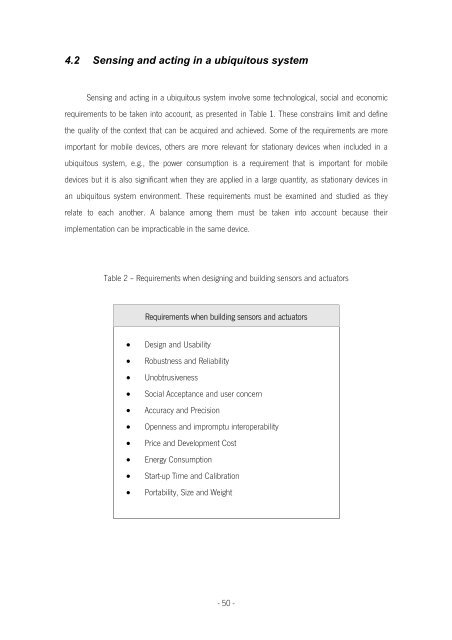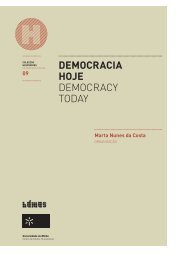Carlos Manuel Rodrigues Machado Autonomic Ubiquitous Computing
Carlos Manuel Rodrigues Machado Autonomic Ubiquitous Computing
Carlos Manuel Rodrigues Machado Autonomic Ubiquitous Computing
Sie wollen auch ein ePaper? Erhöhen Sie die Reichweite Ihrer Titel.
YUMPU macht aus Druck-PDFs automatisch weboptimierte ePaper, die Google liebt.
4.2 Sensing and acting in a ubiquitous system<br />
Sensing and acting in a ubiquitous system involve some technological, social and economic<br />
requirements to be taken into account, as presented in Table 1. These constrains limit and define<br />
the quality of the context that can be acquired and achieved. Some of the requirements are more<br />
important for mobile devices, others are more relevant for stationary devices when included in a<br />
ubiquitous system, e.g., the power consumption is a requirement that is important for mobile<br />
devices but it is also significant when they are applied in a large quantity, as stationary devices in<br />
an ubiquitous system environment. These requirements must be examined and studied as they<br />
relate to each another. A balance among them must be taken into account because their<br />
implementation can be impracticable in the same device.<br />
Table 2 – Requirements when designing and building sensors and actuators<br />
Requirements when building sensors and actuators<br />
• Design and Usability<br />
• Robustness and Reliability<br />
• Unobtrusiveness<br />
• Social Acceptance and user concern<br />
• Accuracy and Precision<br />
• Openness and impromptu interoperability<br />
• Price and Development Cost<br />
• Energy Consumption<br />
• Start-up Time and Calibration<br />
• Portability, Size and Weight<br />
- 50 -

















